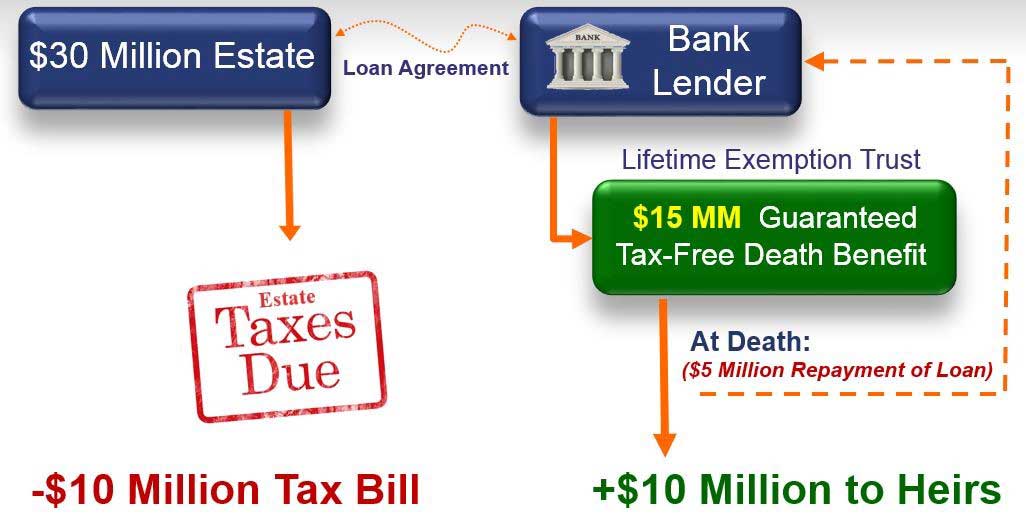Worried about Estate Taxes? One Strategy to Try
If your heirs might face a big estate tax bill one day, an irrevocable life insurance trust could help protect your legacy.


Profit and prosper with the best of Kiplinger's advice on investing, taxes, retirement, personal finance and much more. Delivered daily. Enter your email in the box and click Sign Me Up.
You are now subscribed
Your newsletter sign-up was successful
Want to add more newsletters?

Delivered daily
Kiplinger Today
Profit and prosper with the best of Kiplinger's advice on investing, taxes, retirement, personal finance and much more delivered daily. Smart money moves start here.

Sent five days a week
Kiplinger A Step Ahead
Get practical help to make better financial decisions in your everyday life, from spending to savings on top deals.

Delivered daily
Kiplinger Closing Bell
Get today's biggest financial and investing headlines delivered to your inbox every day the U.S. stock market is open.

Sent twice a week
Kiplinger Adviser Intel
Financial pros across the country share best practices and fresh tactics to preserve and grow your wealth.

Delivered weekly
Kiplinger Tax Tips
Trim your federal and state tax bills with practical tax-planning and tax-cutting strategies.

Sent twice a week
Kiplinger Retirement Tips
Your twice-a-week guide to planning and enjoying a financially secure and richly rewarding retirement

Sent bimonthly.
Kiplinger Adviser Angle
Insights for advisers, wealth managers and other financial professionals.

Sent twice a week
Kiplinger Investing Weekly
Your twice-a-week roundup of promising stocks, funds, companies and industries you should consider, ones you should avoid, and why.

Sent weekly for six weeks
Kiplinger Invest for Retirement
Your step-by-step six-part series on how to invest for retirement, from devising a successful strategy to exactly which investments to choose.
Imagine having a thriving family business that you plan to leave to your heirs.
Or maybe there’s a substantial piece of land that you want to leave your children.
During the estate-planning process, however, you discover your beneficiaries will be subject to a $10 million tax bill. (That may sound impossible, considering the $11.4 million federal estate tax exclusion, but it can happen with a large family business — especially when you take into consideration possible state taxes.) And the only way for your estate to pay this tax liability, in the absence of additional advanced planning, may be to sell the family business or the land you hoped to pass on.
From just $107.88 $24.99 for Kiplinger Personal Finance
Become a smarter, better informed investor. Subscribe from just $107.88 $24.99, plus get up to 4 Special Issues

Sign up for Kiplinger’s Free Newsletters
Profit and prosper with the best of expert advice on investing, taxes, retirement, personal finance and more - straight to your e-mail.
Profit and prosper with the best of expert advice - straight to your e-mail.
You don’t want your heirs to be forced into a fire sale, where they would have to take any offer just to liquidate as quickly as possible. But what can you do?
Fortunately, there is another way for people with multimillion-dollar estates to address these potential liquidity needs by using an irrevocable life insurance trust (ILIT) strategy.
How It Works
High-net-worth individuals and families often wonder about the best way to create a seamless estate plan. Though there are many options, trust-owned life insurance (TOLI) is frequently a good fit for those who have illiquid assets (such as businesses, land or qualified plans). It enables the trust to balance inheritances among beneficiaries estate-tax-free, which is one of the top issues among wealthy individuals. It’s also useful for individuals who want to give to charity when they die.
With an ILIT strategy, assets owned by the trust pass to the beneficiaries according to the grantor’s wishes, without being subject to federal estate taxes. This is possible because the owner is the trust, which now removes the proceeds from the insured’s estate. The trustee then maintains the policy or policies, which opens up the family to a variety of important tax-planning and charitable giving opportunities. At death, the death benefit proceeds will be paid to the designated beneficiaries of the trust both income and estate tax-free.
TOLI premiums are typically funded by annual exclusion gifts, but they also can be funded by using private financing or premium financing.
An Illustration: One Couple’s Story
To see this strategy in action, let's consider an example. Dr. & Mrs. Anderson have a $30 million estate and are approaching a $10 million tax bill upon their passing. They are somewhat “cash poor” but do not want to liquidate assets. Premium financing will prove to be beneficial to them. Let me explain how.
Fundamentally, premium financing is a planning strategy that enables Dr. & Mrs. Anderson to pay the premiums for the coverage they need without having to liquidate assets. The Andersons will come to an arrangement through which they will borrow money at a competitive interest rate from a bank to pay for their life insurance policy with an approximate $15 million death benefit. The policy cash value is generally used as the majority of the collateral for the loan.
Put visually, it would look like this:

By leveraging the lender’s capital rather than their own to pay annual premiums, they will be able to retain their capital in high-returning investments. The loan could be paid off from: 1) a portion of the death benefit proceeds upon the death of the insured, whether it is Dr. or Mrs. Anderson, 2) a tax-free withdrawal from a portion of the cash value, or 3) an asset sale in the future.
Advantages of Trust-Owned Life Insurance
Not only can this strategy help achieve effective tax planning, but it also allows for the proceeds to be used to help the estate pay expenses and taxes once the grantor passes away. This liquidity opportunity is available through a provision that allows the trust the discretion to purchase assets from either spouse’s estate or to make loans to either estate, which keeps cash available.
An ILIT also gives an individual the opportunity to donate to a charity while preserving an inheritance for any chosen beneficiaries. The ILIT provides a death benefit that replaces the value of the gift made to charity.
In addition, gifts made to the ILIT eventually will reduce the overall value of the estate, which will, in turn, reduce the amount that would be calculated in the taxable amount.
Potential Pitfalls
If you are thinking about gifting to your life insurance policy, it’s important to be aware of the gift tax liability. For 2019, any gift that is greater than $15,000 for the year ($30,000 for married couples) applies against the gift-tax exclusion and requires filing Form 709. So, the maximum premium you would be able to gift without gift-tax liability would be $30,000. Many times, this just isn’t enough to properly plan one’s estate.
Many people need large policies that require much more than what the annual gift exclusion allows to cover their needs. This is where premium financing can be a valuable tool for those who want to maximize their estate with a substantial life insurance death benefit and without having to liquidate and pay taxes on other investments to make large premium payments. Premium financing also avoids using up your annual gift tax exclusions and reducing your overall lifetime exemptions.
In addition, by leveraging a lender’s capital rather than your own to pay annual premiums, you retain a significant amount of capital you can use to maintain or make investments or preserve your savings or cash flow needs. If the policy performs favorably compared to the loan interest rate, premium financing offers you the opportunity to potentially earn a higher level of interest from the policy than the interest you pay for the loan. In essence, we finance our homes, our businesses and practically everything else, so why shouldn’t we finance our life insurance?
But premium financing does have some risks. For example, lending rates may increase to a higher level than projected, which may require posting collateral with the bank. Financial institutions typically require borrowers to provide collateral from liquid assets, such as securities, and if those securities decrease in value, the lender may require additional collateral. Longevity also can be a risk; the longer the insured individual lives, the greater the amount of cumulative loan principal and interest, which could reduce, and even possibly eliminate, the ILIT’s remaining net death benefit.
It’s Complicated, So Get Help
Though an ILIT strategy can be a valuable option for those who want to protect their estate from a burdensome (or even nightmarish) tax bill, it requires several complex legal and financial decisions. A premium-financed plan, in particular, can require constant monitoring. To help you navigate the nuances, you’ll want to tap an experienced and independent financial professional and an estate attorney.
As difficult as it is for you and your loved ones to think about your death, having a plan in place is the only way to ensure your legacy carries on. Gifting, taxes and charitable giving should be a priority if you hope to efficiently and effectively transfer the estate you worked so hard to build. If you don’t have a plan, I can assure you the government has one for you.
Kim Franke-Folstad contributed to this article.
Profit and prosper with the best of Kiplinger's advice on investing, taxes, retirement, personal finance and much more. Delivered daily. Enter your email in the box and click Sign Me Up.

Michael Jankowski is president and CEO of the Chicago-based wealth management and estate planning firm Wealth Planning Network (www.wpn360.com). A frequent seminar leader and lecturer, he specializes in working with physicians, business owners and corporate executives.
-
 The New Reality for Entertainment
The New Reality for EntertainmentThe Kiplinger Letter The entertainment industry is shifting as movie and TV companies face fierce competition, fight for attention and cope with artificial intelligence.
-
 Stocks Sink With Alphabet, Bitcoin: Stock Market Today
Stocks Sink With Alphabet, Bitcoin: Stock Market TodayA dismal round of jobs data did little to lift sentiment on Thursday.
-
 Betting on Super Bowl 2026? New IRS Tax Changes Could Cost You
Betting on Super Bowl 2026? New IRS Tax Changes Could Cost YouTaxable Income When Super Bowl LX hype fades, some fans may be surprised to learn that sports betting tax rules have shifted.
-
 The 4 Estate Planning Documents Every High-Net-Worth Family Needs (Not Just a Will)
The 4 Estate Planning Documents Every High-Net-Worth Family Needs (Not Just a Will)The key to successful estate planning for HNW families isn't just drafting these four documents, but ensuring they're current and immediately accessible.
-
 Love and Legacy: What Couples Rarely Talk About (But Should)
Love and Legacy: What Couples Rarely Talk About (But Should)Couples who talk openly about finances, including estate planning, are more likely to head into retirement joyfully. How can you get the conversation going?
-
 How to Get the Fair Value for Your Shares When You Are in the Minority Vote on a Sale of Substantially All Corporate Assets
How to Get the Fair Value for Your Shares When You Are in the Minority Vote on a Sale of Substantially All Corporate AssetsWhen a sale of substantially all corporate assets is approved by majority vote, shareholders on the losing side of the vote should understand their rights.
-
 How to Add a Pet Trust to Your Estate Plan: Don't Leave Your Best Friend to Chance
How to Add a Pet Trust to Your Estate Plan: Don't Leave Your Best Friend to ChanceAdding a pet trust to your estate plan can ensure your pets are properly looked after when you're no longer able to care for them. This is how to go about it.
-
 Want to Avoid Leaving Chaos in Your Wake? Don't Leave Behind an Outdated Estate Plan
Want to Avoid Leaving Chaos in Your Wake? Don't Leave Behind an Outdated Estate PlanAn outdated or incomplete estate plan could cause confusion for those handling your affairs at a difficult time. This guide highlights what to update and when.
-
 I'm a Financial Adviser: This Is Why I Became an Advocate for Fee-Only Financial Advice
I'm a Financial Adviser: This Is Why I Became an Advocate for Fee-Only Financial AdviceCan financial advisers who earn commissions on product sales give clients the best advice? For one professional, changing track was the clear choice.
-
 I Met With 100-Plus Advisers to Develop This Road Map for Adopting AI
I Met With 100-Plus Advisers to Develop This Road Map for Adopting AIFor financial advisers eager to embrace AI but unsure where to start, this road map will help you integrate the right tools and safeguards into your work.
-
 The Referral Revolution: How to Grow Your Business With Trust
The Referral Revolution: How to Grow Your Business With TrustYou can attract ideal clients by focusing on value and leveraging your current relationships to create a referral-based practice.